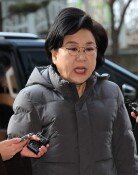Prosecutors Raid Support Offices of 11 Lawmakers
Prosecutors Raid Support Offices of 11 Lawmakers
Posted November. 06, 2010 10:01,
Prosecutors raided Friday the support offices of 11 incumbent lawmakers alleged to have received illegal political funds in return for helping pass a bill on expanding benefits for private security guards.
The surprise raids were made simultaneously and put politicians into a panic.
The regional offices of the lawmakers are considered a hard target for investigation, so the legal and political circles speculate that prosecutors secured sufficient evidence to prove the suspicions surrounding the legislators. Many say the lawmakers will be summoned for questioning right after the Group of 20 summit next week.
○ Are prosecutors sure?
The surprise raids came immediately after the political circle protested the criminal probe into the scandal but prosecutors showed signs of balking at the protests. Observers say the raids were the prosecutions expression of its discontent over political pressure and confidence over the evidence secured on the politicians` alleged irregularities.
In particular, some say offense is the best defense for prosecutors amid mounting calls from the political circle for a reinvestigation into the illegal surveillance of politicians and citizens by the government.
Insiders say the purpose of the raids was to secure evidence to reinforce their case; in other words, prosecutors have in their possession crucial evidence.
Prosecutors sought accounting records of political donations, the lawmakers appointments and schedules, and lists of visitors to the lawmakers offices to secure additional evidence.
Justice Minister Lee Kwi-nam defended the raids to the National Assembly, saying they had just cause to carry them out.
In contrast, critics say the raids were part of a hurried bid by prosecutors to secure key evidence before political protests grew bigger.
○ Rapidly completed raids
In the raids, investigators focused on securing computer hard drives containing information on political donations to the politicians and donors by sending three to five staff members to each office.
The office of Rep. Choi Kyu-sik of the main opposition Democratic Party remained depressed throughout the day after the raids. He allegedly received 50 million won (45,167 U.S. dollars) from the rent-a-cop lobbying organization.
Three investigators put Chois office in northern Seoul on lockdown for more than an hour to search for evidence. They took out a case of confiscated items from the office.
The raids on other lawmakers offices reportedly ended in an hour or less, quicker than the three to four hours usually needed to raid corporate offices.
○ Continued controversy over prosecutors
A dispute has emerged over whether the politicians can be punished for violating the political funds law. This is because prosecutors must prove that the donations made in individual names were money from a certain organization, and that the lawmakers were aware of this at the time of the donations.
In August 2008, the Supreme Court upheld a lower courts ruling against Kim Byung-ho, a former lawmaker of the ruling Grand National Party, alleged to have taken 10 million won (9,025 dollars) from a lobbying group for medical doctors.
The court, however, acquitted another lawmaker, Koh Kyung-hwa, in January last year on the same charges.
The rulings were affected by whether the lawmakers were aware of the source of the funds.
Thus observers say the raids were aimed at securing evidence to prove the politicians collusion with the lobbying group for private security guards.
The fact that a local court issued search warrants for the 11 lawmakers could mean that prosecutors conducted sufficient preliminary investigations into the cases, a prosecution official said.
jefflee@donga.com ceric@donga.com







